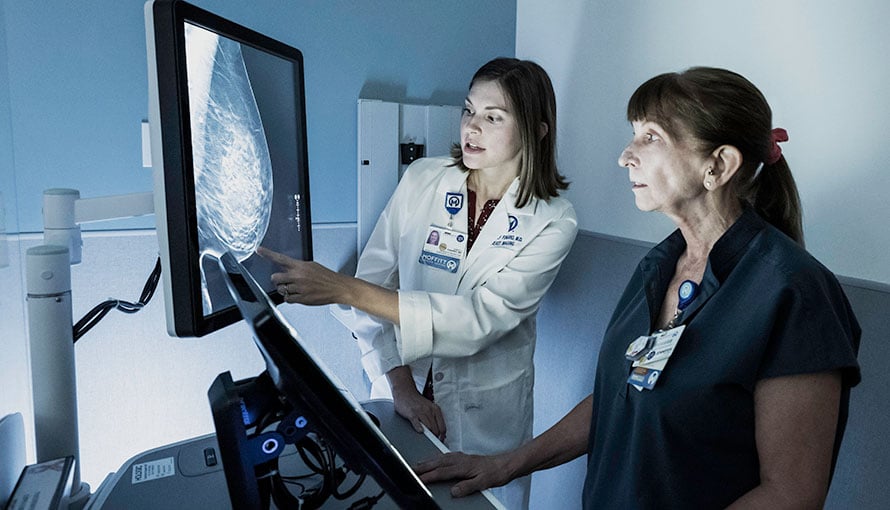Breast Cancer Treatment
Breast cancer results from the uncontrolled growth of abnormal breast cells, which can form tumors and spread throughout the breast and to other parts of the body. Through ongoing research, scientists are learning more about breast cancer every day, and breast cancer treatment options are continually advancing as a result.

Breast Cancer Outcomes
The goal of any cancer treatment is to achieve the most favorable outcome while minimizing side effects and ensuring the best possible quality of life. On average, Moffitt's breast cancer treatment survival rates exceed 1.5 times the national average.
Depending on several unique factors, including the type and stage of the tumor and the patient’s overall health and preferences, breast cancer treatment may include:
Surgery for breast cancer
Surgery may be performed to remove as much of the tumor as possible, along with any affected lymph nodes. The types of breast cancer surgery include:
Lumpectomy
A type of breast-conserving surgery, lumpectomy involves removing the tumor and a slim margin of surrounding healthy tissue. The amount of tissue removed can vary depending on the size of the tumor. The remainder of the breast is preserved.
Mastectomy
To treat or help prevent breast cancer, a surgeon will remove part or all of the breast tissue along with some lymph nodes in the armpit area. The types of mastectomy include:
Total mastectomy
Also known as a simple mastectomy, a total mastectomy involves removing the entire breast, including the breast tissue, nipple, areola and skin.
Bilateral mastectomy
Also known as a double mastectomy, a bilateral mastectomy involves removing both breasts.
Prophylactic (preventive) mastectomy
Performed to help prevent breast cancer in a high-risk patient, a prophylactic mastectomy involves removing one or both breasts before cancer develops.
Skin-, areola- and nipple-sparing mastectomies
To allow for easier and more natural-looking breast reconstruction, various structures on the surface of the breast, such as the skin, areola and nipple, are preserved when the underlying breast tissue is removed.
Modified radical mastectomy
The breast tissue is removed and an axillary lymph node dissection is performed during the same surgical session to remove lymph nodes from the armpit area, which drain lymph from the breast.
Breast reconstruction
After undergoing a mastectomy or lumpectomy, some women opt for breast reconstruction surgery, which involves rebuilding the shape and contour of the breast using an artificial implant or tissue obtained from another part of the body.
Sentinel node mapping and biopsy
A physician will inject a special dye near the tumor to identify the lymph nodes that drain lymph from the breast (sentinel nodes), which are usually the first tissues affected by breast cancer spread. The physician will remove the sentinel nodes and send them to a lab for microscopic examination by a pathologist, who can identify cancerous cells. If the sentinel nodes are found to be cancer-free, a sentinel node mapping and biopsy may eliminate the need for more extensive surgery.
Chemotherapy for breast cancer
Chemotherapy involves the administration of powerful cancer-fighting drugs, which enter the bloodstream and circulate throughout the body to target and destroy widespread cancer cells. Chemo may be used alone as a primary treatment for breast cancer. For heightened effectiveness, it can also be used in combination with other treatments, such as surgery and radiation therapy.
Chemo drugs can be delivered intravenously or orally. The specific drug regimen can vary depending on the type and stage of the tumor and the patient’s age, overall health and genetic characteristics. A fertility specialist can help plan treatment for a woman who is pregnant or would like to preserve her fertility.
Radiation therapy for breast cancer
Radiation therapy involves the use of high-energy beams to destroy cancerous cells. It is often administered after breast cancer surgery to target any remaining cancer cells and help prevent a recurrence. The types of radiation therapy for breast cancer include:
External beam radiation therapy (EBRT)
To administer EBRT, a radiation therapist will use an external machine (linear accelerator) to precisely deliver the high-energy beams directly to the tumor.
Intraoperative radiotherapy
During breast cancer surgery, a surgeon will use the advanced INTRABEAM® mobile irradiation device to deliver a carefully measured dose of radiation to the tumor site.
Hormone therapy for breast cancer
Also known as endocrine therapy, hormone therapy involves the use of special medications that target hormone-sensitive breast cancer cells. The treatment works by blocking the body’s natural production of certain hormones (estrogen and progesterone) that can fuel breast cancer growth.
Commonly used to treat hormone receptor-positive breast cancer, hormone therapy may be used in combination with other treatments, such as surgery, chemotherapy or radiation therapy. The treatment may be administered before surgery to shrink a tumor and make it easier to remove, then continued after surgery to help prevent a recurrence.
Targeted drug therapy for breast cancer
Targeted therapy involves the use of special medications that target cancer cells while minimizing any damage to healthy cells. The treatment works by blocking specific molecules involved in the growth, progression and spread of the cancer.
Targeted therapy can be used alone or in combination with other treatments, such as chemotherapy or hormone therapy. It is often used to treat HER2-positive breast cancer and other types of breast cancer that have specific molecular targets.
Immunotherapy for breast cancer
Immunotherapy capitalizes on the natural power of the body’s immune system by “training” it to recognize, target and destroy breast cancer cells. One type of immunotherapy for breast cancer involves the use of checkpoint inhibitors, which help the immune system differentiate between healthy cells and cancerous cells. Immunotherapy may be paired with chemotherapy for heightened effectiveness.
Clinical trials for breast cancer
Clinical trials are important research studies designed to help scientists and clinicians evaluate the effectiveness of promising new therapies compared to the current standard of care. In addition to receiving personalized care and close monitoring from a dedicated team of experienced breast cancer specialists, a patient who chooses to participate in a clinical trial can be among the first to benefit from a groundbreaking treatment option that is not yet available in other settings.

How do I manage the side effects of breast cancer treatment?
The side effects of breast cancer treatment can vary depending on the type of treatment, the patient’s overall health and other unique factors. In general, some patients experience:
- Overwhelming fatigue
- Nausea and vomiting
- Hair loss
- Appetite changes
- Unintended weight loss or gain
- Pain or discomfort
- Skin changes, such as dryness, redness and rashes
- Menopausal symptoms, such as hot flashes and vaginal dryness
- Cognitive changes, such as memory problems and difficulty concentrating
- Emotional changes, such as anxiety and depression
- Tissue swelling due to fluid buildup (lymphedema)
- Bone loss (osteoporosis)
- Fertility issues
During and after breast cancer treatment, it is important for the patient to discuss any side effects with their healthcare team and to explore any available support services, such as:
- Medication management
- Supplements and nutrition counseling
- Exercise and physical therapy
- Relaxation techniques, such as meditation and yoga
- Therapeutic massage
- Counseling and psychological support
- Spiritual support
Frequently asked questions (FAQs) about breast cancer treatment
The following FAQs-related articles provide additional information about breast cancer treatment:
- What should I expect with a total mastectomy?
- Will I need chemotherapy after a total mastectomy?
- Questions to ask before a total mastectomy
- How long after diagnosis should I receive breast cancer treatment?
- Questions to ask your breast cancer specialist
- Four things you should know about breast cancer chemotherapy
- Three breast cancer symptoms not to ignore
- What are the most common types of breast cancer?
- What does a breast cancer lump feel like?
- Will I lose my hair with breast cancer treatment?
- What should I expect from my first mammogram?
- How often should I receive a breast cancer screening?
- What is inflammatory breast cancer?
- What does an inflammatory breast cancer rash look like?
- Can breast cancer recur after a mastectomy?
- How to do a self breast exam
- Where does breast cancer spread to first?
- What are the early signs of inflammatory breast cancer?
- What are the signs that breast cancer has spread?
Benefit from world-class care at Moffitt Cancer Center
The Don & Erika Wallace Comprehensive Breast Program at Moffitt offers a full range of the latest breast cancer treatment options in one location, including a robust portfolio of clinical trials. Our multispecialty team includes experts in all relevant disciplines, such as surgeons, medical and radiation oncologists, pathologists, radiologists, plastic surgeons and supportive care specialists. As a nationally recognized leader in cancer research, Moffitt is proud to be the only National Cancer Institute-designated Comprehensive Cancer Center based in Florida.
If you would like to learn more about breast cancer treatment, you can request an appointment with a specialist in our Don & Erika Wallace Comprehensive Breast Program by calling 1-888-663-3488 or submitting a new patient registration form online. We do not require referrals.
References
Treatment Options for Breast Cancer
Breast Cancer: Types of Treatment
How Is Breast Cancer Treated? | CDC
Helpful Links:
